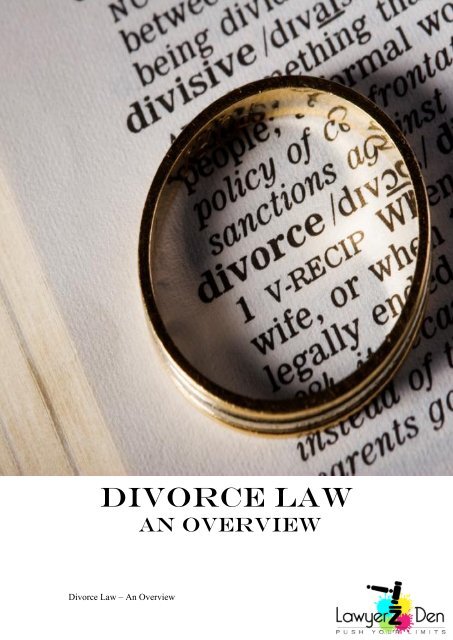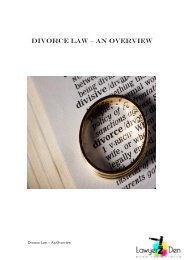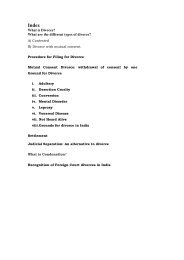DIVORCE LAW
Create successful ePaper yourself
Turn your PDF publications into a flip-book with our unique Google optimized e-Paper software.
<strong>DIVORCE</strong> <strong>LAW</strong><br />
AN OVERVIEW<br />
Divorce Law – An Overview
About The Author<br />
I am currently an independent legal<br />
practitioner. I have completed my<br />
Bachelor of Laws (B.A., LL.B<br />
(Hons.)) degree programme from<br />
National Law Institute University,<br />
Bhopal (India) in the year 2005.<br />
During my years of work experience<br />
I have had the opportunity to<br />
appear before all courts / forums<br />
and tribunals including Supreme<br />
Court, Delhi High Court, Districts<br />
Courts in Delhi and Gurgaon,<br />
Telecom Dispute Settlement &<br />
Appellate Tribunal (TDSAT) etc.<br />
An active member of the Delhi<br />
Legal Aid Society. Having<br />
considerable experience in<br />
conducting Criminal trials and have<br />
considerable experience in handling<br />
various litigations for individuals as<br />
well as corporate houses.<br />
Divorce Law – An Overview
Index<br />
What is Divorce?<br />
What are the different types of divorce?<br />
A) Contested<br />
B) Divorce with mutual consent.<br />
Procedure for Filing for Divorce<br />
Mutual Consent Divorce: withdrawal of consent<br />
by one Ground for Divorce<br />
i. Adultery<br />
ii. Desertion Cruelty<br />
iii. Conversion<br />
iv. Mental Disorder<br />
v. Leprosy<br />
vi. Venereal Disease<br />
vii. Not Heard Alive<br />
viii. Grounds for divorce in India<br />
Settlement<br />
Judicial Separation: An alternative to divorce<br />
What is Condonation?<br />
Recognition of Foreign Court divorces in India<br />
Divorce under the Hindu Law: An overview<br />
Divorce Law – An Overview
What is Divorce?<br />
“Marriages may be made in heaven, but the<br />
maintenance must be done on earth”, the aforesaid<br />
saying is no more of any importance in today‟s so<br />
called westernised societies.<br />
In a society like India most of the people dare to<br />
the word „divorce‟, but these days the Indians are<br />
looking towards western countries and following<br />
them. When husband and wife can‟t adjust in their<br />
relationship then they decide to end up their<br />
relationship by way of divorce. A divorce is<br />
the legal separation of man and wife, by the<br />
judgment of a court. In other words, is a legal<br />
action between married couple to terminate their<br />
marriage relationship? It can be referred to as<br />
Divorce Law – An Overview
dissolution of marriage and is basically, the legal<br />
action that ends the marriage before the death of<br />
either spouse.<br />
What are the different types of divorce?<br />
India is a land of varied religious communities<br />
having their own marriage laws, the divorce<br />
procedure too varies, according to the community<br />
of the couple seeking divorce. All Hindus as well as<br />
Buddhists, Sikhs and Jains can seek divorce<br />
under the Hindu Marriage Act, 1955. The Muslim,<br />
Christian and Parsi communities, on the other<br />
hand, have their own laws governing marriage and<br />
divorce. Spouses belonging to different<br />
communities and castes can seek divorce under<br />
the Special Marriage Act, 1956. There is also the<br />
Foreign Marriage Act 1969, governing divorce laws<br />
in marriages where either partner belongs to<br />
another nationality. The Hindu Marriage Act, 1955<br />
recognizes two types of divorce, i) Contested or ii)<br />
Divorce with mutual consent.<br />
Divorce Law – An Overview
Contested Divorce : A contested divorce is one in<br />
which the parties cannot agree, either about<br />
getting divorced or about the terms of the divorce,<br />
such as the alimony, division of assets, allocation<br />
of debts, child support, or the custody of the<br />
children. It happens when divorcing parties can't<br />
reach an agreement on certain matters and need a<br />
court to decide for them. Not all estranged couples<br />
agree on the desirability, grounds or the conditions<br />
of divorce. In such cases, one party files for divorce<br />
in the court, but the other contests it. This forms<br />
the case for the filing of a contested divorce. Some<br />
of the grounds on which either spouse can file for<br />
a divorce in India are:<br />
<br />
<br />
<br />
Adultery on the part of the spouse of the petitioner,<br />
or any other sexual relationship outside marriage.<br />
Willful desertion or abandonment of the petitioner<br />
by the spouse, for a continuous period of two years<br />
in India, before the date of the filing for divorce.<br />
Infliction of physical and/or mental torture on the<br />
petitioner by the spouse, which may result in<br />
danger to life and health of the former.<br />
Divorce Law – An Overview
Sexual impotency or inability to perform sexual<br />
intercourse by the spouse of the petitioner.<br />
Insanity or suffering from incurable disease by the<br />
spouse of the petitioner.<br />
Often couples will begin the process of a contested<br />
divorce and then, before the actual trial, reach<br />
agreement on the financial terms and otherwise-of the<br />
divorce.<br />
Mutual Consent Divorce : Seeking a divorce in India<br />
is a long-drawn out legal affair, it takes atleast a<br />
minimum of six months to get divorced. However, the<br />
time and money required to obtain a divorce can be<br />
considerably shortened if the couple seeks divorce by<br />
mutual consent. In divorce with mutual consent,<br />
estranged spouses can mutually agree to a settlement<br />
and file for a “no-fault divorce” under Section 13B of<br />
the Hindu Marriage Act 1955. However, for filing for a<br />
divorce on this ground, it is necessary for the husband<br />
and wife to have lived separately for at least a year.<br />
Living separately does not mean living at far places or<br />
not sharing accommodation but not living like a<br />
husband and a wife be it under the single roof. The<br />
scheme of this Section provided for a petition to be<br />
presented satisfying three grounds: i) the parties have<br />
been living separately for one (1) year or more; ii) that<br />
they have not been able to live together; and iii) they<br />
have mutually agreed that the marriage should be<br />
dissolved.<br />
However, even after the Court is required to be<br />
satisfied on account of the aforesaid parameters, there<br />
Divorce Law – An Overview
is a further hiatus period provided under sub-section<br />
(2) of Section 13B of the said Act as the second motion<br />
has to be presented not earlier than six (6) months<br />
after the date of presentation of the petition referred to<br />
in sub-section (1) [not more than eighteen (18) months<br />
after the said date] if the earlier petition is not<br />
withdrawn in the mean time. On the satisfaction of the<br />
Court a decree for dissolution of the marriage can be<br />
passed. It is now settled legal position that this period<br />
of six (6) months cannot be waived by either the trial<br />
court or the High Court and the only exception to the<br />
same is the Supreme Court exercising power under<br />
Article 142 of the Constitution of India. Where the<br />
Supreme Court finds an irretrievable breakdown of<br />
marriage it can do complete justice under the said<br />
Article. Supreme Court in Anil Kumar Jain v. Maya<br />
Jain (2009) 10 SCC 415 (para 17) has held:<br />
This doctrine of irretrievable break-down of<br />
marriage is not available even to the High<br />
Courts which do not have powers similar to<br />
those exercised by the Supreme Court under<br />
Article 142 of the Constitution. Neither the<br />
civil courts nor even the High Courts can,<br />
therefore, pass orders before the periods<br />
prescribed under the relevant provisions of<br />
the Act or on grounds not provided for in<br />
Section 13 and 13-B of the Hindu Marriage<br />
Act, 1955.<br />
Divorce Law – An Overview
Also see Chetan Dass v. Kamla Devi (2001) 4 SCC<br />
250 (para 14).<br />
Procedure for Filing for Divorce<br />
The procedure for seeking a divorce by mutual<br />
consent, is initiated by filing a joint petition, supported<br />
by affidavits from both partners, in the Family Court of<br />
the concerned district. This is known as the First<br />
Motion Petition for Mutual Consent Divorce, this<br />
should contain a joint statement by both partners, that<br />
due to their irreconciliable differences, they can no<br />
longer stay together and should be granted a divorce<br />
by the court. After six months, the Second Motion<br />
Petition for Mutual Consent Divorce should be filed by<br />
the couple and they are required to reappear in the<br />
court. A gap of six months is given between the two<br />
motions, so as to offer the estranged couple adequate<br />
time to reconsider their decision of dissolving their<br />
marriage, this is often called the „cooling off period”.<br />
After hearings from the husband and wife, if the judge<br />
is satisfied that all the necessary grounds and<br />
requirements for the divorce have been met, the couple<br />
is granted a mutual divorce decree.<br />
Mutual Consent Divorce: withdrawal of consent<br />
by one<br />
Divorce Law – An Overview
Divorce cannot be granted to a Hindu couple if<br />
either of the spouse withdraws the consent before<br />
the judicial decree is passed. In other words, unless<br />
there is a complete agreement between the husband<br />
and the wife for the dissolution of the marriage and<br />
unless the court is completely satisfied, it cannot<br />
grant a decree for divorce by mutual consent.<br />
The question whether the consent of both the parties<br />
given at the time of presentation of the petition for<br />
mutual divorce under Section 13-B of the Act must<br />
continue till the decree is finally passed, has been the<br />
subject matter of several decisions of Supreme Court.<br />
The issue was raised in the case of Smt. Sureshta<br />
Devi vs. Om Prakash (1991) 2 SCC 25, wherein the<br />
Court held that the consent given by the parties to<br />
the filing of a petition for mutual divorce had to<br />
subsist till a decree was passed on the petition and<br />
that in the event, either of the parties withdrew the<br />
consent before passing of the final decree, the<br />
petition under Section 13-B of the Hindu Marriage<br />
Act would not survive and would have to be<br />
dismissed. The Court observed that:<br />
“...filing of the petition under section 13-B (l) with<br />
mutual consent does not authorise the Court to<br />
make a decree for divorce...”<br />
Divorce Law – An Overview
“...the section does not provide that if there is a<br />
change of mind it should not be by one Party<br />
alone, but by both. Therefore, if one of the parties<br />
at that stage withdraws its consent the Court<br />
cannot pass a decree of divorce by mutual<br />
consent. If the Court is held to have the power to<br />
make a decree solely based on the initial petition<br />
it negates the whole idea of mutuality and<br />
consent for divorce.”<br />
That the supreme Court in another decision of Hitesh<br />
Bhatnagar vs Deepa Bhatnagar (2011) 5 SCC 234 ,<br />
where both the parties filed an application for divorce<br />
under section 13B and the respondent later on<br />
withdrew her consent after a period of 18 months<br />
saying that she wasn‟t willing for a divorce and wanted<br />
to live with him. The appellant wanted the court to<br />
grant him the decree of divorce by considering it as<br />
time-barred. Apex Court while dismissing the matter<br />
ruled out that either husband or wife could withdraw<br />
consent to divorce at any time before the decree is<br />
passed by the competent court. In simpler words, SC<br />
has simply lifted the time bar to withdraw the consent.<br />
Justice H. L. Dattu while hearing the matter observed<br />
that:<br />
“The most important requirement for a grant<br />
of a divorce by mutual consent is free consent<br />
of both the parties. In other words, unless<br />
there is a complete agreement between<br />
husband and wife for the dissolution of the<br />
marriage and unless the Court is completely<br />
Divorce Law – An Overview
satisfied, it cannot grant a decree for divorce<br />
by mutual consent. Otherwise, in our view,<br />
the expression `divorce by mutual consent'<br />
would be otiose.”<br />
Grounds for Divorce<br />
Grounds for divorce is the legal reason for filing<br />
for divorce. Some people confuse grounds with fault.<br />
They fail to understand that under no fault divorce the<br />
courts no longer concern themselves with who is at<br />
fault for the problems in the marriage. There must be a<br />
reason for ending a marriage and in most states that<br />
reason may be as simple as “irreconcilable differences.”<br />
In other words one spouse may be of the opinion that<br />
the marriage has broken down is beyond saving. The<br />
other spouse has little or no say in whether or not there<br />
is a divorce. A petition for divorce may be presented by<br />
either the husband or wife for dissolving the marriage<br />
on the following grounds:<br />
Adultery – The act of indulging in any kind of sexual<br />
relationship including intercourse outside<br />
marriage is termed as adultery. Adultery is<br />
counted as a criminal offence and substantial<br />
proofs are required to establish it. An amendment<br />
to the law in 1976 states that one single act of<br />
adultery is enough for the petitioner to get a<br />
divorce. It is not possible to lay down a hard and<br />
Divorce Law – An Overview
fast rule about it since the decision of each case<br />
must depend upon its own merits and turn upon<br />
its own circumstances. But it is clear that for<br />
invoking the application of (old) cl. (i) of sub-sec.<br />
(1) of s. 13, it must be shown that the period<br />
during, which the spouse was living an adulterous<br />
life was so related from the point of proximity of<br />
time, to the filing of the petition that it could be<br />
reasonably inferred that the petitioner had a fair<br />
ground to believe that, when the petition was filed,<br />
the respondent was living in adultery This<br />
expression implies that a single lapse from virtue<br />
even if true will not suffice, and it must be shown<br />
that the respondent was actually living in adultery<br />
with someone else at the time of the application.<br />
Living in adultery is different from failing to lead a<br />
chaste life. See Rohtash Singh v. Smt. Ramendri<br />
& Ors. JT 2000 (2) SC 553<br />
Desertion – If one of the spouses voluntarily abandons<br />
his/her partner for at least a period of two years,<br />
the abandoned spouse can file a divorce case on<br />
the ground of desertion. Desertion as a ground for<br />
divorce has been added to s.13 by the Marriage<br />
Laws (Amendment) Act 1976. Previously, it was<br />
only a ground for judicial separation. Now<br />
desertion is a ground for both judicial separation<br />
Divorce Law – An Overview
and divorce. For the offence of desertion so far as<br />
deserting spouse is concerned, two essential<br />
conditions must be there (1) the factum of<br />
separation and (2) the intention to bring<br />
cohabitation permanently to an end (animus<br />
deserendi). Similarly two elements are essential so<br />
far as the deserted spouse is concerned: (1) the<br />
absence of consent, and (2) absence of conduct<br />
giving reasonable cause to the spouse leaving the<br />
matrimonial home to form the necessary intention<br />
aforesaid [see Lachman Utamchand Kirpalani v.<br />
Meena alias Mota AIR 1964 (SC) 40 ]. Many nonresident<br />
Indians (NRI) come to India to marry girls<br />
who are also aspirants to migrate from India by<br />
this marriage relation. It is often seen that some<br />
NRIs marry local girls, enjoy them and return to<br />
the foreign countries with vague hopes behind that<br />
their wives would be taken after completion of<br />
official formalities. But all those hopes are never<br />
materialized. Sometimes they receive papers in<br />
India in the form of foreign divorce decree.<br />
Cruelty –<br />
A spouse can file a divorce case when he/she is<br />
subjected to any kind of mental and physical<br />
injury that causes danger to life, limb and health.<br />
The expression "cruelty" has not been defined in<br />
the Act. Cruelty can be physical or mental, A.<br />
Jayachandra v. Aneel Kaur (2005) 2 SCC 22.<br />
Divorce Law – An Overview
Mental cruelty in Section 13(l)(ia) can be broadly<br />
defined as the conduct which inflicts upon the<br />
other party such mental pain and suffering as<br />
would make it not possible for that party to live<br />
with the other. In other words, mental cruelty<br />
must be of such a nature that the parties cannot<br />
reasonably be expected to live together. The<br />
situation must be such that the wronged party<br />
cannot reasonably be asked to put up with the<br />
other party. It is not necessary to prove that the<br />
mental cruelty is such as to cause injury to the<br />
health of the petitioner. While arriving at such<br />
conclusion, regard must be had to the social<br />
status, educational level of the parties, the society<br />
they move in, the possibility or otherwise of the<br />
parties ever living together in case they are already<br />
living apart and all other relevant facts and<br />
circumstances. What is cruelty in one case may<br />
not amount to cruelty in another case. In that case<br />
allegations were made by the wife in her written<br />
statement and question put by her counsel to her<br />
husband that he and all the members of his family<br />
were lunatic etc. All these constitute mental<br />
cruelty. In the absence of a positive act of cruelty a<br />
party is not entitled to obtain a decree of divorce.<br />
Divorce Law – An Overview
The intangible acts of cruelty through mental<br />
torture are not judged upon one single act but<br />
series of incidents. Certain instances like the food<br />
being denied, continuous ill treatment and abuses<br />
to acquire dowry, perverse sexual act and such are<br />
included under cruelty. See Samar Ghosh v.<br />
Jaya Ghosh (2007) 2 SCC 511, Savitri Pandey<br />
v. Prem Chandra Pandey (2002) 2 SCC 73,<br />
Parveen Mehta v. Inderjit Mehta (2002) 5 SCC<br />
706.<br />
Conversion – Incase either of the two converts himself/herself<br />
into another religion, the other spouse may file a<br />
divorce case based on this ground. A Hindu<br />
marriage may be dissolved by a decree of divorce<br />
on the ground that the respondent has ceased to<br />
be a Hindu by conversion to another religion.<br />
Though s. 13(1)(ii) confers expressly right on a<br />
spouse to present a petition for divorce against<br />
the other spouse who has changed his or her<br />
religion after the solemnization of marriage, but<br />
the apostate can also file a petition for dissolution<br />
of marriage after he or she has ceased to be a<br />
Hindu under the Hindu Marriage Act. Mere<br />
professing or theoretical allegiance to a religion<br />
Divorce Law – An Overview
other than a Hindu religion does not mean<br />
conversion for the purpose of this provision.<br />
There must be voluntary relinquishment of Hindu<br />
religion by the respondent and formal ceremonial<br />
conversion to another religion so as to attract this<br />
provision for the purpose of divorce.<br />
Mental Disorder – Mental disorder can become a ground for<br />
filing a divorce if the spouse of the petitioner<br />
suffers from incurable mental disorder and<br />
insanity and therefore cannot be expected from the<br />
couple to stay together. Prior to the Marriage Laws<br />
(Amendment) Act 1976, a petition for divorce might<br />
be presented by a spouse on the ground (a) that<br />
the respondent had been incurably of unsound<br />
mind, and (b) that the respondent had been so for<br />
a continuous period of not less than three years<br />
immediately before the filing of the petition. By the<br />
Marriage Laws (Amendment) Act 1976, the period<br />
of duration of unsoundness of mind has been<br />
omitted and elaborative clarifications have been<br />
made. The expression 'incurably of unsound mind'<br />
cannot be so widely interpreted as to cover feebleminded<br />
person or persons of dull intellect who<br />
understand the nature and consequences of their<br />
acts and are able, therefore, to control themselves<br />
and their affairs and their reactions in the normal<br />
Divorce Law – An Overview
way. Where this ground is taken for dissolution of<br />
marriage, the said ground must be proved by<br />
cogent and clear evidence beyond reasonable<br />
doubt so as to satisfy the court. Eccentricities do<br />
not constitute psychopathic disorder or any other<br />
kind of mental disorder. See Pankaj Mahajan<br />
v. Dimple@ kajal (2011) 12 SCC 1.<br />
Leprosy – In case of a „virulent and incurable‟ form of<br />
leprosy, a petition can be filed by the other spouse<br />
based on this ground. A petition for divorce may be<br />
presented by either party to the marriage on the<br />
ground that the respondent has been suffering from<br />
a virulent and incurable leprosy. Virulent means<br />
malignant or venomous. The onus to prove the<br />
ingredients of cl. (iv) of s. 13(1) is on the petitioner.<br />
When it is not disputed that the respondent has<br />
been suffering from leprosy, the onus is on the<br />
petitioner to establish that the leprosy is virulent<br />
and incurable. A spouse cannot be compelled to live<br />
with the other spouse who is suffering from an<br />
aggravated form of leprosy and who can give the<br />
petitioner and children leprosy almost any moment<br />
in their daily life. Thus the Legislature by a statute<br />
has given an aggrieved spouse a way of relief. See<br />
Divorce Law – An Overview
Swarajya Lakshmi V. G.C. Padma Rao AIR 1974<br />
(SC) 165.<br />
Venereal Disease – If one of the spouses is suffering from a<br />
serious disease that is easily communicable, a<br />
divorce can be filed by the other spouse. The<br />
sexually transmitted diseases like AIDS are<br />
accounted to be venereal diseases. Venereal<br />
disease in a communicable form is a ground for<br />
obtaining a decree for dissolution of marriage. This<br />
ground affords also a ground for obtaining a decree<br />
for judicial separation.<br />
Not Heard Alive – If a person is not seen or heard alive by<br />
those who are expected to be „naturally heard‟ of<br />
the person for a continuous period of seven years,<br />
the person is presumed to be dead. The other<br />
spouse should need to file a divorce if he/she is<br />
interested in remarriage. A divorce may be granted<br />
on the ground that the respondent has not been<br />
heard of as being alive for a period of seven years<br />
or more by those persons who would naturally<br />
have heard of it, had that party been alive. This is<br />
a legal presumption of death which is based on<br />
English law of evidence. The presumption is drawn<br />
by reason of the fact that if the person were living,<br />
Divorce Law – An Overview
the person would probably have communicated<br />
with some of his or her friends and relatives. This<br />
presumption under the provision of law is not rigid<br />
and death may even be presumed before lapse of<br />
seven years from proof of special circumstances.<br />
The onus of proving the absence of the respondent<br />
for the statutory period without being heard of as<br />
alive lies on the petitioner. The petitioner is<br />
required to give particulars relating to the last date<br />
of cohabitation, the date and place last seen the<br />
respondent and steps taken to trace the<br />
respondent. Evidence as to reasonable inquiry or<br />
search about the respondent is necessary to be<br />
adduced by the petitioner. But the onus of proving<br />
that the respondent is alive lies on the person who<br />
pleads so.<br />
Grounds for divorce in India: The following are the<br />
grounds for divorce in India on which a petition can be filed<br />
only by the wife.<br />
‣ If the husband has indulged in rape, bestiality and<br />
sodomy.<br />
‣ If the marriage is solemnized before the Hindu<br />
Marriage Act and the husband has again married<br />
another woman in spite of the first wife being alive,<br />
the first wife can seek for a divorce.<br />
Divorce Law – An Overview
‣ A girl is entitled to file for a divorce if she was married<br />
before the age of fifteen and renounces the marriage<br />
before she attains eighteen years of age.<br />
‣ If there is no co-habitation for one year and the<br />
husband neglects the judgment of maintenance<br />
awarded to the wife by the court, the wife can contest<br />
for a divorce.<br />
Settlement<br />
Marriages belong to Heaven where as Divorce, is the devil's<br />
domain - complicated and traumatic. Divorce proceedings in<br />
India are intended to be lengthy affairs and this is backed<br />
by the belief that an extended litigation time span may allow<br />
couples to reconsider their decision for divorce. Also,<br />
because of the social non-acceptance of divorces and the<br />
reluctance of the affluent sections of society to expose their<br />
lives to the inevitable public glare, most high profile divorces<br />
have property settlements done out of the court. In most<br />
cases in India, the fulcrum of divorce litigation is alimony.<br />
Alimony in India is decided on the basis of income and<br />
background of the couple. In select cases, alimony paid to<br />
the wife is based on the standard of living enjoyed by the<br />
couple while married. Law on this aspect is still developing<br />
and there have been recent judgements which state that<br />
because of social changes where women are no longer<br />
dependent on their husbands or other family members,<br />
their pleas for alimony need to be looked into with all fact,<br />
Divorce Law – An Overview
and it should be ensured that one of the spouses should not<br />
be enriched at the cost of the other. As far as the issue of<br />
division of property is concerned, the same is primarily<br />
decided on the facts of each case and for this principles of<br />
equity are used. This is required because our law is not<br />
clear on the concept of common matrimonial property. It is<br />
deemed that a property in India belongs to the person in<br />
whose name it is bought, even if it has been acquired during<br />
the course of marriage. Hence, even if a wife pays for some<br />
property and it is in the name of her husband, there is no<br />
way to prove during divorce proceedings that it rightfully<br />
belongs to her unless the wife produces evidence that she<br />
had paid for the said property. A settlement is often entered in<br />
to the divorces by mutual consent and it settles all the conditions<br />
between the parties that will govern them at the time of the divorce<br />
and thereafter. Both the parties are bound by the these terms and<br />
conditions and there are less changes of backing out and in case<br />
one party to the agreement backs out then the other party can get<br />
the agreement enforced by the Court of law.<br />
Judicial Separation: An alternative to divorce<br />
Separation, instead of divorce, is an option that can be<br />
pursued by a married couple when their marriage is falling<br />
apart. Judicial separation is a sort of a last resort before the<br />
actual legal break up of marriage i.e. divorce. The reason for<br />
the presence of such a provision under Hindu Marriage Act<br />
is the anxiety of the legislature that the tensions and wear<br />
Divorce Law – An Overview
and tear of everyday life and the strain of living together do<br />
not result in abrupt break up of a marital relationship.<br />
There is no effect of a decree for judicial separation on the<br />
subsistence and continuance of the legal relationship of<br />
marriage as such between the parties. The effect however is<br />
on their co-habitation. Once a decree for judicial separation<br />
is passed, a husband or a wife, whosoever has approached<br />
the court, is under no obligation to live with his / her<br />
spouse.<br />
Judicial separation is different from a divorce. Being<br />
Judicially separated means spouses can live apart while<br />
retaining their marital status. The same issues addressed in<br />
a divorce are also addressed in a Judicial separation. It is<br />
important to arrive at a separation agreement one can live<br />
with long term. The main difference between separation and<br />
divorce is that divorce ends the marriage. Spouses return to<br />
an unmarried status and are thus are allowed to remarry.<br />
Separation lets couples keep their married status while<br />
acknowledging that they are no longer living together. A<br />
legal separation allows some cool-off time for a troubled<br />
couple and gives them a chance to reconcile their<br />
relationship, and if things work out well between the couple<br />
later, the legal separation can be ended and the couple can<br />
continue their marriage.<br />
What is Condonation:<br />
Divorce Law – An Overview
Under Indian laws pertaining to marriage disputes,<br />
condonation means pardoning a matrimonial offence such<br />
as adultery. The concept of condonation also involves<br />
reinstating the offending spouse to the same level of respect<br />
and mutual understanding that s/he enjoyed before<br />
committing the offence. It must be noted that a spouse<br />
cannot seek matrimonial relief on the ground of lapse by the<br />
other if it was already condoned. Almost all the statutes<br />
under Indian laws provide condonation as a bar for seeking<br />
matrimonial relief. Under Indian laws pertaining to marriage<br />
disputes, condonation means pardoning a matrimonial<br />
offence such as adultery. Condonation is one of the defenses<br />
to the fault grounds for divorce. Condonation is the<br />
forgiveness or acceptance by one spouse of the other<br />
spouse's wrongful behaviour that otherwise could be used<br />
as grounds for a divorce.<br />
An example of condonation is a husband who does not<br />
object to his wife's adultery. If the husband sues his wife for<br />
divorce, claiming she has committed adultery, the wife may<br />
argue as a defense that her husband condoned her<br />
behavior. The following are required for a court to find<br />
condonation and to deny a fault-based divorce:<br />
‣ The condoning spouse knows about the other<br />
spouse's wrongful behavior,<br />
‣ The condoning spouse forgives the offending spouse<br />
‣ The condoning spouse does not deny the offending<br />
spouse sexual relations<br />
Divorce Law – An Overview
The recent trend is to eliminate defenses in divorce cases,<br />
and states that have adopted marriage breakdown or a<br />
similar standard as the sole reason for divorce have<br />
eliminated condonation as a defense.<br />
Recognition of Foreign Court divorces in India<br />
A divorce obtained by an NRI from a foreign court without<br />
the spouse's submission to the jurisdiction of that court is<br />
invalid. A divorce granted by a foreign court on the ground<br />
of "irretrievable" breakdown of marriage is not recognised<br />
under the Hindu Marriage Act and the dissolution of<br />
marriage cannot be valid. If both parties are Indians and the<br />
marriage between them was solemnized in India according<br />
to Hindu rites and both are governed by the Hindu Marriage<br />
Act (HMA) then the marriage between them cannot be<br />
dissolved by way of a foreign decree. The Supreme Court in<br />
Y Narashimha Rao & ors V. Y.Venkata Lakshimi & Anr.<br />
(1991) 3 SCC 451 declined to give its imprimatur to foreign<br />
decree which did not take into consideration the provisions<br />
of Hindu Marriage Act under which the parties were<br />
married. The Supreme Court while interpreting Section 13<br />
of CPC has held that unless the respondent voluntarily and<br />
effectively submitted to the jurisdiction of the foreign court<br />
and contested the claim which is based on the grounds<br />
available in the matrimonial law under which the parties<br />
were married, the judgment of the foreign court could not be<br />
relied upon. Delhi High Court in the case of Pritam Ashok<br />
Sadaphule v. Hima Chugh (2013) 200 DLT 374, has<br />
Divorce Law – An Overview
efused to recognize a decree passed in a foreign court on<br />
the ground of irretrievable breakdown of marriage. Para 12<br />
of the said judgment reads as under :-<br />
“It is admitted position that both the parties<br />
are Indians and marriage between them was<br />
solemnised at New Delhi according to Hindu<br />
rites and ceremonies and both are governed<br />
by Hindu Marriage Act, 1955. Their marriage<br />
has been dissolved by Ilford County Court in<br />
UK on the ground of having been broken<br />
down irretrievably which is not a ground for<br />
divorce under the Hindu Marriage Act…”<br />
Divorce is one of the most stressful things that can happen<br />
in a lifetime. Next to losing someone we care about, divorce<br />
ranks as a top stressor. Any time that we are under stress,<br />
we are vulnerable to making short-term reactive decisions<br />
that can have negative long-term effects. While avoiding<br />
emotional heartache is almost impossible, it is wise to be<br />
on alert and aware of some of the traps we may fall into. We<br />
should be committed to avoid the marriage breakups.<br />
Divorce Law – An Overview
Divorce Law – An Overview
Divorce Law – An Overview<br />
The thoughts collated in this module are that of the author and LawyerzDen shall take no responsibility under any<br />
copyright laws, for the same. The author may be directly contacted at sidharthkhatana@gmail.com









